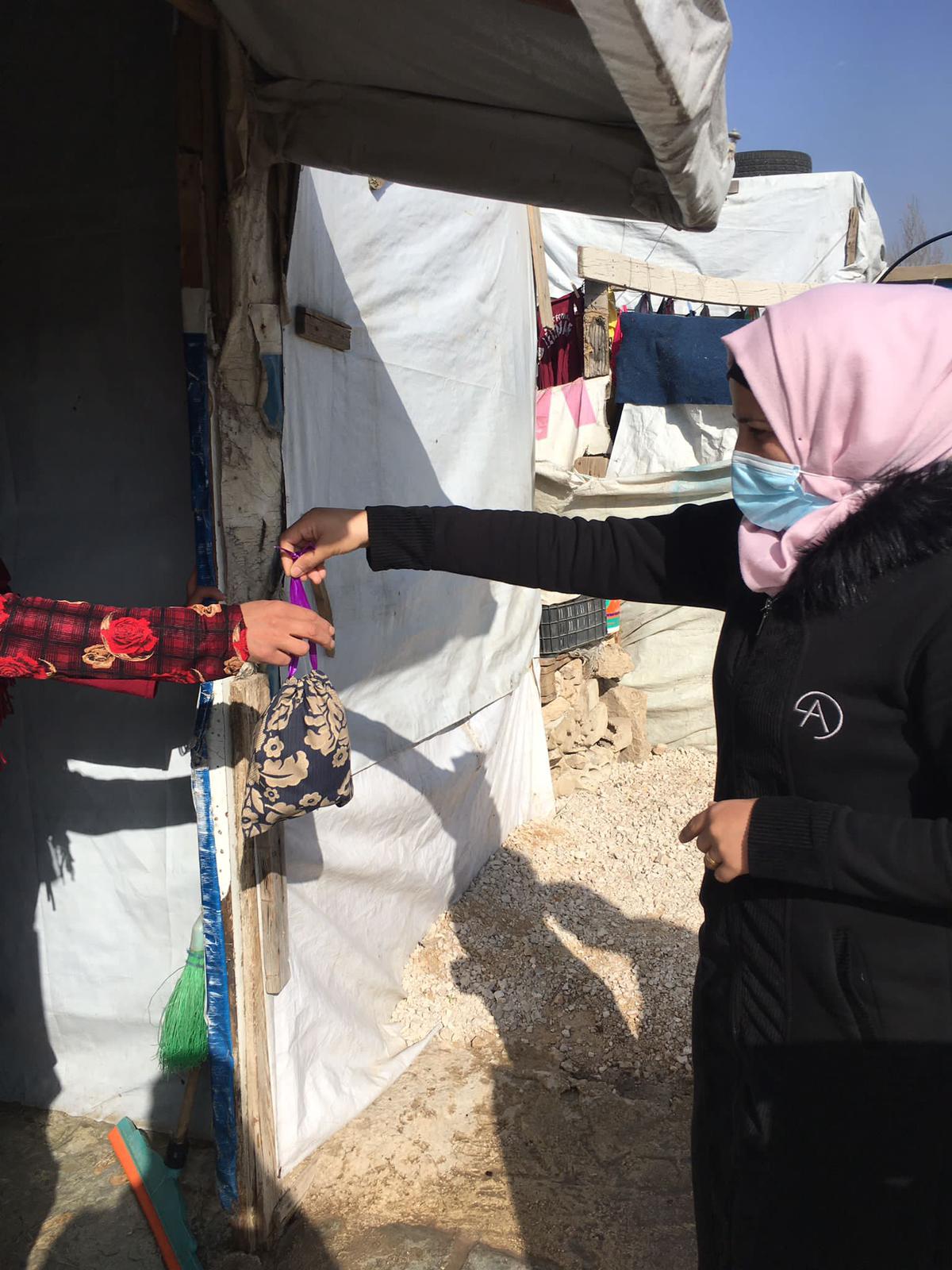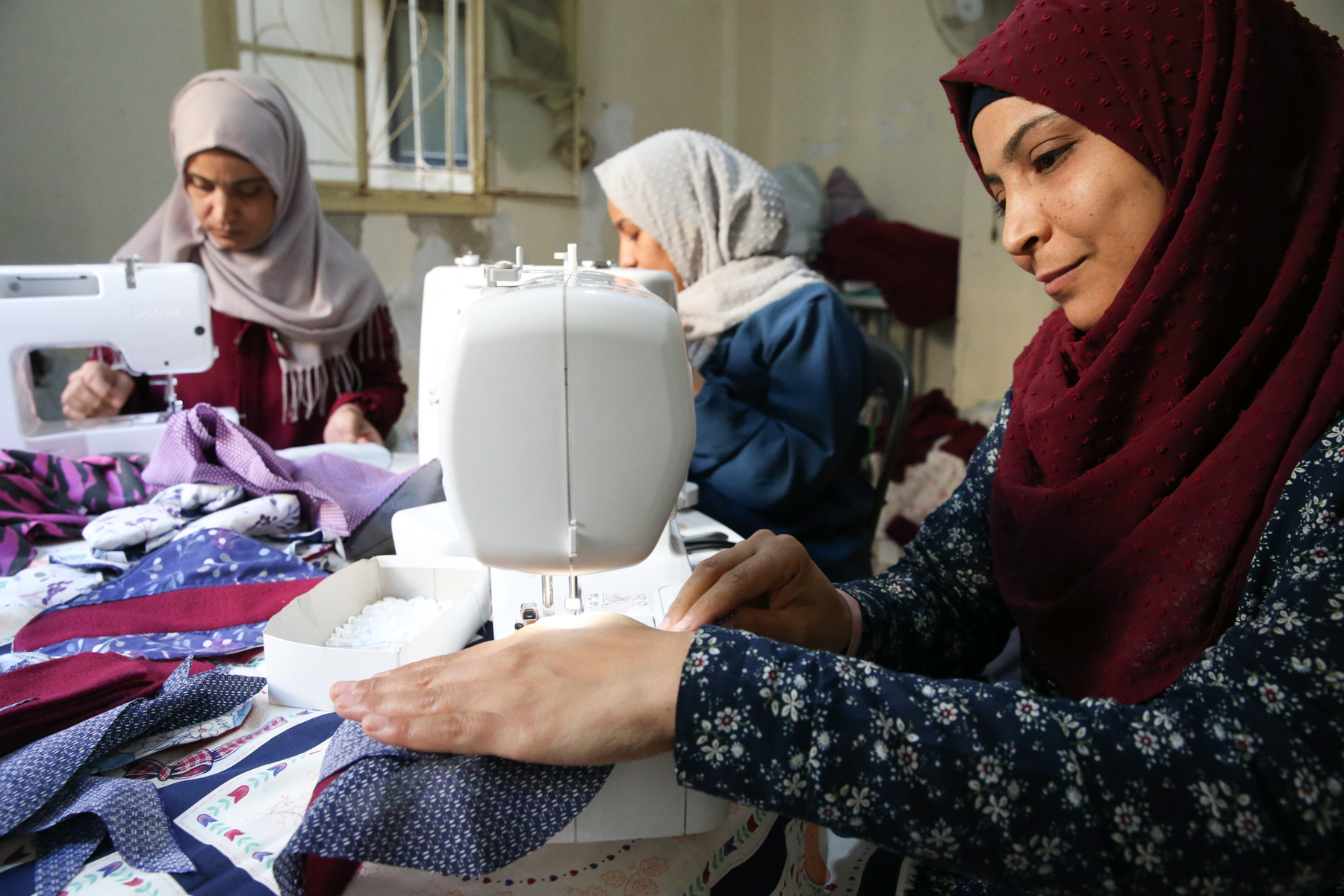Written by Lauren Crosby Medlicott
While an estimated 500 million menstruating people around the world are affected by period poverty, those within refugee camps are especially vulnerable. Lauren Crosby Medlicott investigates what needs to be done.
Period poverty is a phrase we’re hearing more often as the cost-of-living crisis sweeps across most of the world. There are an estimated 500 million menstruating people impacted by the lack of access to period products, education, hygiene facilities and waste management. Within refugee camps and communities, period poverty is even more problematic for women and girls.
There are at least 82.4 million forcibly displaced people around the world. Of those, around 2.6 million are living in official refugee camps – temporary facilities built to provide immediate protection and assistance to people who have fled their homes due to war, persecution or violence.
Millions not living in official camps are living in informal camps and urban areas.Even though women and girls make up around 50% of this population, period poverty is rampant and largely unaddressed among refugees and asylum seekers.
Lack of products
Women and girls living in refugee camps have very little, if any, expendable income as they aren’t allowed to work. The money they do receive from governments is used to pay for priority necessities like food for themselves and their children. Period products, while essential for women and girls to go about their days, take a back seat to staying alive.
“Quite shockingly, women have said they use things like newspapers, leaves, their children’s clothes and socks – anything as something for a pad,” says Meelie Pemberton, founder of WingWoman Lebanon, a social enterprise providing employment and period products for women in refugee camps in Lebanon.
The use of these items, coupled with poor water and sanitation, can lead to various infections, including urinary tract infections that are often left untreated.
In Lebanon, where Pemberton is based, the price of period pads has risen by 500% as the country spirals into deeper financial crisis. Within this context there are appropriately 500,000 Syrian women refugees trying to care for themselves and their families. But it isn’t just Lebanon. Refugee camps in Myanmar, Greece, Brazil, Ukraine and Uganda are among the countries where period poverty in refugee camps has been reported on.

Pemberton says that while NGOs provide hygiene kits for women in camps, they often only provide a pack of cheap pads that will last for one month. “Pads are a very low priority and there are definitely stories of women choosing to feed their children before buying pads for themselves.”
When women and girls do get their hands on pads, they are often poor-quality, disposable ones that cause irritation, foul odours, painful rashes and infections.
One solution would be to make reusable products more widely available for women and girls in refugee camps, but without appropriate places to clean these products or education about why and how to use them, reusables aren’t an option.
Inappropriate spaces
“Conditions vary from camp to camp and country to country,” Melissa Robel, president of Pads 4 Refugees, a small NGO supplying refugee camps and NGO projects with period products, says about the facilities available to women in camps.
“Water access is a big issue. Some camps have it, others don’t. This is important because if there is no water access, reusable pads don’t work because there is no way to clean them.”
You may also be interested in
Ukraine: Poland’s near-total ban on abortion has left Ukrainian refugees struggling to access healthcare
Water to clean period products isn’t the only thing refugee women are missing when it comes to caring for themselves on their periods. In addition to water, women need spaces to dry reusable period products and bins to discard disposable products.
Inadequate access to a private, comfortable and well-located toilet creates hindrances to hygienic practices that are culturally appropriate. Women in camps often uphold modesty as a virtue and feel embarrassed exposing their bodies in public toilets shared by men and women.
There are also accounts of sexual assault and harassment in shared toilet spaces. “Camps are not always lit well at night, making trips to the toilet dangerous for women and girls,” says Robel. “Toilets are not always separated by gender, so many women and girls experience sexual harassment or gender-based violence while waiting in the queue, or even in the toilet.”
Some have managed menstruation by seeking out locations of darkness to avoid sexual harassment and assault in shared toilets, near railroad tracks or in fields, an unsafe alternative when private, secure toilets for women were unavailable.

Cultural stigmas about periods
“There is so much taboo and stigma around periods that it is very difficult for these women to ask or pay for period products,” explains Pemberton. “They don’t have the confidence, language or vocabulary to discuss periods.”
When Pemberton runs awareness sessions in camps in Lebanon, she says she can see the anger in women when they discover how they haven’t been allowed to talk about something so natural and normal as having a period. “They leave our sessions excited, with the taboo having been slightly broken,” she says. “Then they go home to male partners and parents who enforce the stigmas again, telling them not to bring it up – that it’s a woman’s problem.”
If women and girls in refugee camps feel ashamed to talk about their periods, there is a risk they will suffer in silence through period poverty, potentially keeping them from being able to do things such as caring for their families or attending school.
Solutions for a complex issue
Period poverty in refugee camps cannot have a one-size-fits-all approach as there will be individual needs for each woman and girl dependent on their situation, culture and location. It’s a complex issue requiring a complex solution.
“Individuals should have the choice to use what they are most comfortable with,” says Robel. “I have had people say to me, ‘Beggars can’t be choosers.’ This is unacceptable. I am particular about the period products I use. I want what works best for my period. Women and menstruators living in camps and settlements should be able to choose what works best for them.”
For women living in camps with running water and private spaces, reusable pads and cups could mean they are less dependent on a flow of disposable products each month. However, for people living transiently in camps without private toilets or running water, disposable products would work better.
For example, Emma Lambert, founder of The Pachamama Project, a non-profit recruiting volunteers to sew reusable pads for refugees and asylum seekers, visited the Global Expo Centre in Poland in April to see how her project could help menstruating people fleeing Ukraine.
“It’s a big warehouse and there are camp beds laid out as far as the eye could see,” she says. “Thousands of people with no privacy. There was one block of showers and four washing machines for 4,000 people. It’s an appalling situation.” For these women who didn’t have the facilities to use reusables, Lambert collected and distributed disposable pads.
Sadly, though, the unique challenges of period poverty faced in camps don’t stop in refugee camps abroad. “[Women] come from refugee camps to here and they are in the same boat when it comes to period poverty,” says Tina Leslie, founder of Freedom4Girls, a UK-based charity fighting period poverty.
“It doesn’t get any better. They only get a very small amount of money each week. So, if they are here with their family, they have to choose whether to feed their kids or manage their periods; they are going to choose to feed their kids.”
Hundreds of women Leslie and her team have distributed products to in the UK have resorted to using materials like toilet roll, socks and cut-up tea towels during their periods, and that is on top of dealing with the trauma and stress of fleeing their homes.
“They are people, not burdens,” says Leslie. “We need to look after them.”
You may also be interested in
How is the cost of living crisis impacting UK period poverty?
Awareness-raising in wider society is another way to alleviate period poverty. “The more educated the general population is, the higher it will get on the priority list,” says Lambert. “It’s not that people don’t care about the issue, they just don’t know about it.”
Since Lambert started The Pachamama Project during lockdown, she has recruited 1,500 volunteers who have gone on to sew 161,000 pads for refugees, proving people do care and want to work towards solutions.
Education in camps where reusables are an option is needed to dispel stigmas that blood is “gross”. At the start of her sessions in Lebanon, Pemberton asks women if they would be up to using reusable pads that could be kept for three to five years. “99% of the time they say no,” she says. “But then we run the session and they say they will try it. And once they have tried them, the feedback is really good.” If women choose – and it is important they choose rather than being forced – to utilise reusable period products, they will reduce their need for a monthly supply of disposable products.
Finally, governments and large NGOs have got to get on board with recognising period poverty in refugee camps as a human rights issue. They are the ones who can make sure toilets in camps are safe, ensure there are washing, drying, and disposal facilities, and buy and distribute large amounts of period products.
In addition to the organisations mentioned above, read our story on period poverty to find out what you can do to help end the crisis.
Images: The Free Shop Lebanon; The Pachamama Project; Ibrahim Dirani; Wings for Lebanon
Source: Read Full Article